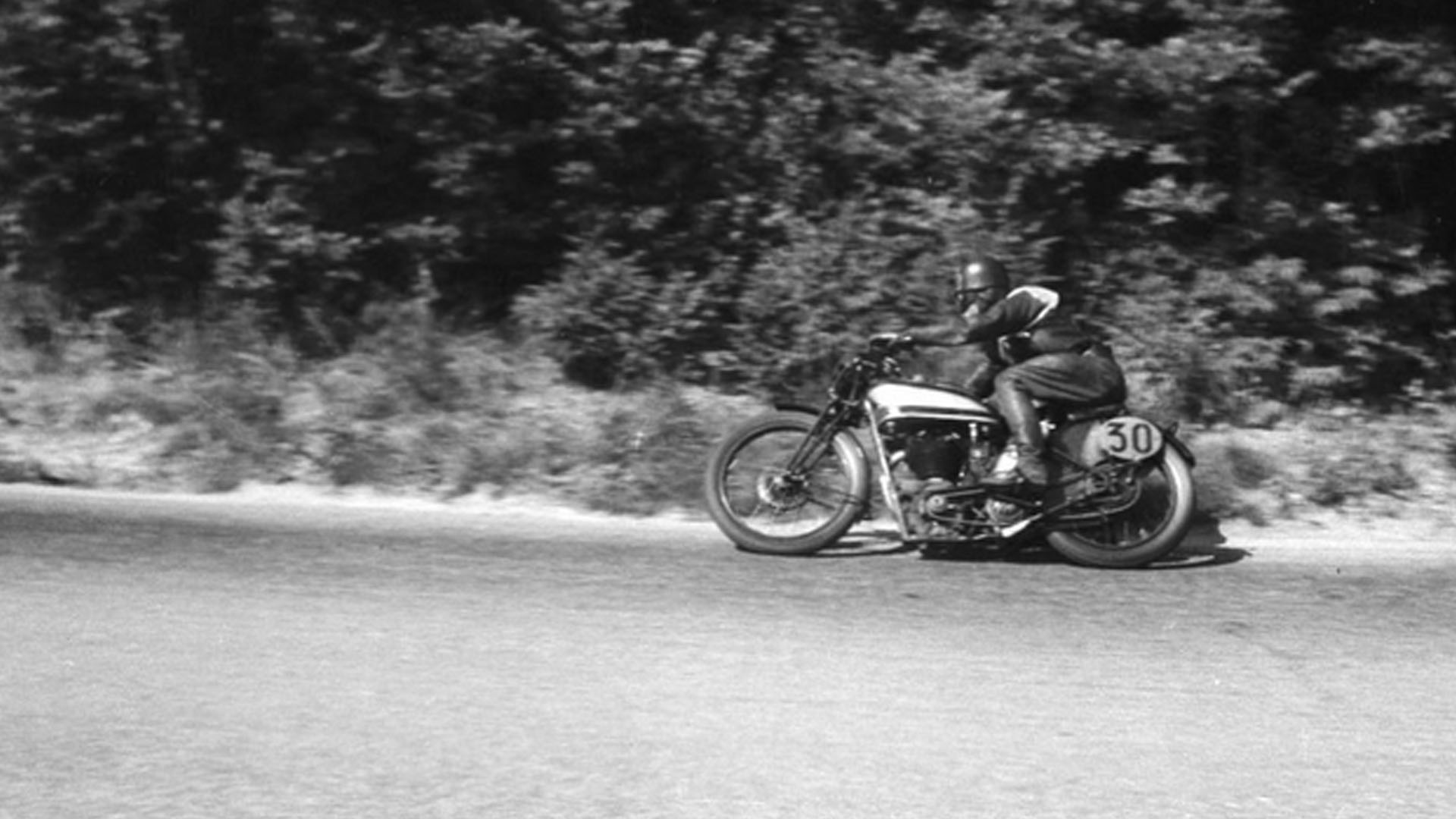Leading Aircraftman Walter Frederick Rusk (966122) served with the Royal Air Force during the Second World War. He was best known as a phenomenal motorcycle road racing talent in the pre-war years.
Rusk was born in Belfast in 1910. He became one of Northern Ireland’s most prominent motorcycle racers of the 1930s.
Achievements on the roads
In 1929, at the age of 18, he started his first North West 200 race on a Sunbeam bike. The following year, he would break the lap record on a Velocette and a promising career began.
Rusk’s first win came in 1931 at the Temple 100 Road Races on a Norton. Noticed by the A.J.S. works team, he joined them for the 1931 Ulster Grand Prix. Due to mechanical problems, he did not finish the race. 1932 saw Rusk join the Rudge team in the 250cc class. The following year, he started his first Isle of Man T.T. on a 500cc Sunbeam. He drew the attention of Joe Craig, team boss at Norton, and joined their team alongside Stanley Woods and Tim Hunt.
On the road racing circuit, he finished 2nd in the 1934 European 350cc Championship. He also won the North West 200 on a 350cc Norton Model 40. He raced across Europe in the years before the Second World War with performances in the German and Swiss Grand Prix’s of 1935.
At the famous Isle of Man T.T., Rusk finished 2nd once and 3rd twice in the mid-1930s. In 1934, he took 3rd in the 500cc class behind Jimmie Guthrie and Jimmy Simpson. The following year, he chalked up a 2nd in the 350cc class behind Guthrie. That year saw another 3rd place behind Stanley Woods and Guthrie again.
In the 1934 Ulster Grand Prix, he finished ahead of the pack on a 500cc Velocette. The following year on the Clady Circuit would not end so well. Racing hard with teammate Jimmie Guthrie, both men spun out of control on the melting tarmac. Guthrie escaped serious injury but Rusk suffered a broken arm.
On his water-cooled A.J.S. V4, he finished 11th at the Isle of Man T.T. in 1939. Teammate Bob Foster came in 13th with the bikes not handling well.
Rusk at the Ulster Grand Prix
Later in 1939, at the Ulster Grand Prix, the two men led from the start outshining the Nortons and Gileras. Foster retired on the first lap with plug trouble. That first lap ended with Walter Rusk in a 34-second lead, breaking circuit records with 100.03 miles per hour average speed.
On the track, Rusk gained the nickname “The Blonde Bombshell”. Always wanting to go faster, he insisted on changes to the sprockets to drive the engine harder. He manhandled the bike around that record-breaking lap before the power of the bike tore apart its own frame. The bumps of the Seven Mile Straight and the power of the Norton engine would break the front forks and cause him to retire on the 3rd lap. The performance earned him the Motorcycle Union of Ireland Gold Medal.
Walter Rusk’s achievements on the track were phenomenal. History remembers Dubliner Stanley Woods as the most successful victor at the Ulster Grand Prix’s Clady circuit. But while Woods clocked up wins, Walter Rusk recorded the first 90mph and 100mph laps in 1934 and 1939.
Remembering Walter Frederick Rusk
1939 saw the outbreak of the Second World War, and like many road racers with a love for speed, Rusk enlisted in the Royal Air Force. While undergoing pilot training with the R.A.F. No. 7 Flight Training School, Walter Frederick Rusk died in a crash on 8th October 1940. As a pilot under training, he crashed Hawker Hart K4368 into high ground at Tilton-on-the-Hill, Leicestershire, England. Co-pilot Flight Sergeant Johnson was also on board the Hart.
Walter Frederick Rusk’s grave is in Division 4, Block 4, Grave 1661, Eastfield Cemetery, Peterborough, Cambridgeshire, England.

